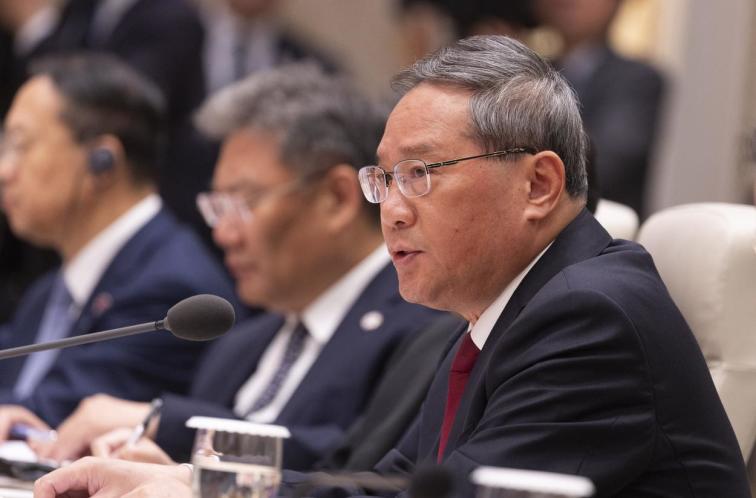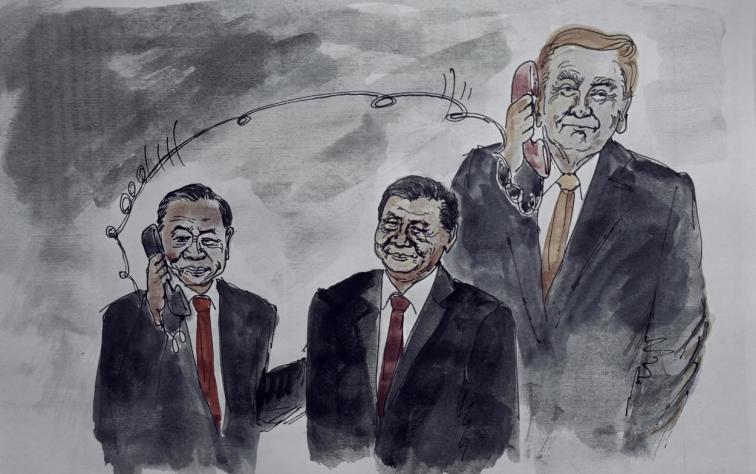On July 8, 2025, Geng He was at Capitol Hill in Washington, D.C. (Photo by Li Chen / Dajiyuan)
[People New] “For me, these eight years have been a living nightmare. Every time I open my eyes, I wonder: is he still alive?”
“Whenever our children make any progress and I want to share it with him, I ask myself: where is their father?”
These were the words of Geng He, wife of renowned Chinese human rights lawyer Gao Zhisheng, delivered at the U.S. Capitol on July 8, 2025, during a seminar marking the 10th anniversary of the "709 Crackdown" on Chinese rights lawyers. Gao Zhisheng was forcibly disappeared again by the Chinese Communist Party (CCP) in August 2017. His fate remains unknown to this day.

In early 2006, lawyer Gao Zhisheng was in his hometown in northern Shaanxi. (Photo provided by Ye Shuang)
Gao Zhisheng, named one of China’s top ten lawyers in 2001, received numerous international human rights awards, including the 2006 “Human Rights Defender Award,” “Special Human Rights Hero Award,” and the American Bar Association’s 2010 “International Human Rights Lawyer Award.” He has been nominated multiple times for the Nobel Peace Prize.
He was repeatedly persecuted by the CCP for defending vulnerable groups such as Falun Gong practitioners, Christians, and petitioners.
On December 31, 2004, Gao submitted an open letter to the National People's Congress, addressing Falun Gong from a legal and professional perspective. In October, November, and December of 2005, he sent three letters to former CCP leaders, exposing the brutal persecution of Falun Gong and urging an end to the atrocities.
In one letter, he wrote: “With a trembling heart and trembling pen, I document the tragic fate of those persecuted (Falun Gong practitioners) over the past six years.”
According to Geng He, “Acting on his conscience as a citizen and a lawyer, he compiled these cases into investigative reports and submitted them to state leaders. In response, in 2005, the authorities revoked his law license and shut down his Beijing law firm.”
In August 2006, Gao was sentenced to three years in prison with a five-year probation. In late 2011, he was imprisoned again in Shaya Prison in Xinjiang, held in solitary confinement for three years. He was released in August 2014, only to be placed under house arrest in a remote village in Shaanxi.
After the 2015 “709 Crackdown,” Gao publicly voiced support for persecuted rights lawyers.
On August 13, 2017, he was again abducted and disappeared by Chinese authorities.
Before his disappearance, he secretly wrote a book on his phone titled “2017: Stand Up, China.” In it, he recounted his experiences of kidnapping, imprisonment, torture, and divine revelations predicting the fall of the CCP.
Now, nearly eight years later, there has been no word.
Geng He said, “The CCP hasn’t given us a single official or written response. No legal documents. Nothing. That way, they avoid any responsibility. No trace exists to show whether he is even alive. He has just vanished from this world.”
“Over these eight years, we’ve hired lawyers and contacted the local police. The answers we get are either the cold 'We don't know,' or a perfunctory 'We’ll check with Beijing'—and then back to 'We don't know.'”
Geng He Calls on the U.S. Government to Lend a Helping Hand
Choking back tears several times during her speech, Geng He called on the U.S. government and officials at the U.S. Embassy in China to meet with Gao Zhisheng’s family and help facilitate a phone call from him to his family, just to let them know he is safe, if he is still alive.
She said, “I earnestly appeal to the U.S. government, to members of Congress who have long been concerned about human rights in China, to human rights organisations, and to people throughout the free world—please do not remain silent.”
“We cannot allow a lawyer who stood up for the rule of law in China to simply vanish into the dark. We must seek justice. Is he dead or alive? This is not only a devastating blow to me and my family, it is a direct challenge to human rights.”
“I ask again: can we take more concrete action?”
“Can the U.S. Embassy in China or a human rights officer meet with Gao Zhisheng’s family?”
“All we ask—just a small request—is for Gao Zhisheng to be allowed to make a phone call home, if he is still alive.”
In 2006, the U.S. House of Representatives passed Resolution 365, demanding that the CCP cease harassing Gao and reinstate his law firm.
“Nineteen years have passed since then,” Geng said. “That resolution has become nothing but a piece of paper. Can we now implement it?”
“Please don’t let Gao Zhisheng remain in this state of being ‘disappeared,’ with no knowledge of life or death. Don’t let his voice be buried forever. Don’t let the darkness cover up the name Gao Zhisheng.”
Her plea has garnered attention and support from multiple sectors.
Scholar: CCP’s Persecution Has Never Stopped
At a July 9 rescue event titled “Where Is Gao Zhisheng?” hosted by the Institute on Religion and Democracy in Washington, D.C., William L. Saunders, Co-Director of the Religious Liberty Centre at The Catholic University of America, said: “The CCP’s persecution of the people has never stopped, and it extends beyond China’s borders. The persecution of Gao Zhisheng and others shows that the CCP is the most brutal regime in the world.”
“Lawyer Gao is a great defender of human rights. Some of my Chinese friends call him the ‘Father of Chinese Human Rights Lawyers’… and now he’s ‘disappeared’ by the most brutal regime on Earth. It’s been eight years.”
He referenced key moments in CCP oppression: The 1989 Tiananmen Square massacre, The 1999 persecution of Falun Gong, The 2015 crackdown on human rights lawyers.
“In 1999, the CCP began persecuting Falun Gong—a meditation practice for mind and body. At the time, practitioners outnumbered CCP members (over 60 million), so the regime cracked down. This persecution continues today.”
“Even when dissidents like Chen Guangcheng escape, or Fu Xiqiu and Falun Gong practitioners go overseas, the CCP still doesn’t let go. They continue trying to suppress them. This is a ruthless regime.”
“The most oppressive regime in the world today is, without a doubt, the Chinese Communist Party.”
Chen Guangcheng: Gao Zhisheng Has Been ‘Legally Extended’ Over 15 Times
At the same event, prominent blind Chinese lawyer Chen Guangcheng noted that under Article 73 of the CCP’s 2014 amended Criminal Procedure Law, “The CCP claims they can arrest anyone without notifying family or lawyers for up to six months. If ‘necessary,’ they can extend it indefinitely.”
“This is an evil, illegal law. Just because it’s written into law doesn’t make it legal.”
“According to the CCP’s logic of ‘legal persecution,’ Gao Zhisheng has been 'legally extended' more than 15 times since 2017.”
He emphasised the need for international cooperation:
“The CCP is an extremely evil regime. It not only harms Chinese people but also poses a grave threat to the entire world. We must think about how to destroy the CCP. It’s not just about helping the Chinese people—it’s for our own sake as well.”
Bob Fu Urges U.S. to Raise Gao’s Case with China
Pastor Bob Fu, founder and president of ChinaAid, also spoke at the July 9 event. He pointed out that the persecution of lawyers like Gao violates China’s own constitution:
“Lawyers are actually the most loyal constitutional believers.”
“When they defend Falun Gong practitioners, Christians, Tibetans, they are holding the Chinese constitution in their hands. But simply because they hold that constitution, they are arrested, tortured, and imprisoned.”
Fu said ChinaAid is urging the U.S. to raise Gao’s case during diplomatic engagements with Beijing and push for a new bipartisan resolution in 2025 to rescue Gao Zhisheng.
U.S. Congressman: New Bill to Help Free Gao Zhisheng
At the July 8 Capitol seminar marking the “709” crackdown’s 10th anniversary, Congressman Chris Smith announced plans for a new bill: “We are preparing to introduce a new bill, the Freedom of Gao Zhisheng Act.”
“This bill would require the State Department to publish a detailed public report outlining the diplomatic actions the U.S. has taken on Gao Zhisheng’s behalf, the responses received, and sanctions implemented.” “It would also mandate a comprehensive diplomatic strategy to protect and release political prisoners, and ensure that officials responsible for Gao’s continued detention and the crackdown on rights lawyers are sanctioned under the Global Magnitsky Act.”











News magazine bootstrap themes!
I like this themes, fast loading and look profesional
Thank you Carlos!
You're welcome!
Please support me with give positive rating!
Yes Sure!